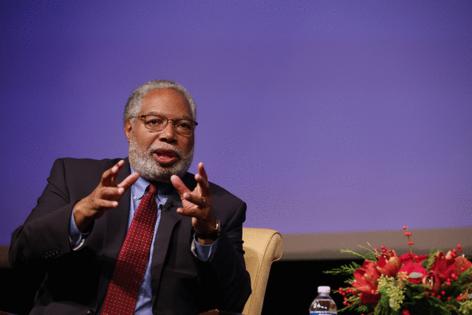Smithsonian leader stands tall as Trump targets 'anti-American ideology'
Published in Political News
Lonnie G. Bunch III has never been afraid to address white supremacy. The leader of the Smithsonian Institution’s 21 museums and the founding director of the National Museum of African American History and Culture (NMAAHC), Bunch may be one of the few leaders in Washington fearless enough to navigate the Trump administration’s machine gun attacks on the arts.
Recently, President Donald Trump issued an executive order to eliminate “anti-American ideology” from the Smithsonian, specifically targeting the NMAAHC and the unbuilt American Women’s History Museum. He instructed Vice President JD Vance to scrub what he deems improper “divisive narratives” from the museums and restore monuments and statues that have been removed over the past five years.
In other words, bring back galloping Confederate generals and lose Black Lives Matter.
In response, Bunch, a former director of the Chicago History Museum, reassured Smithsonian staff: “We remain steadfast in our mission to bring history, science, education, research and the arts to all Americans. … As always, our work will be shaped by the best scholarship, free of partisanship, to help the American public better understand our nation’s history, challenges and triumphs.”
That understanding includes an unvarnished view of the purpose of Confederate monuments. “For African Americans these monuments were really created as examples of white supremacy — to remind people of that status where African Americans should be — not where African Americans wanted to be,” Bunch said in a 2018 symposium called Mascots, Myths, Monuments and Memory.
When the NMAAHC opened in September 2016, I was The Washington Post’s arts editor tasked with directing coverage and editing hundreds of stories about its opening.
It was a bright, shiny time in Washington. Stars such as Oprah Winfrey, Ava DuVernay, Michael Jordan, Stevie Wonder, Samuel L. Jackson and Angela Bassett were among the more than 7,000 invited guests.
The country’s first Black president, Barack Obama, spoke at the dedication. “African American history is not somehow separate than the American story. It is not the underside of the American story. It is central to the American story,” he said as Michelle Obama wiped her eyes.
U.S. Rep. John Lewis, a civil rights hero who fought for 15 years to bring the museum to reality, also addressed the crowd. Lewis died in 2020.
It’s painful to imagine his feelings had he lived to see Trump’s order criticizing the museum for pushing a “divisive, race-center ideology.” The implied threat: Self-censor or we won’t fund you.
Censorship is not without current or historical precedent. Artists are routinely repressed and jailed in Russia, Turkey, China, Brazil, Iran and Afghanistan. Perhaps the most famous contemporary example is China’s imprisonment and torture of artist-activist Ai Weiwei in 2011, who has been living in exile since 2015.
In Russia’s Josef Stalin era, state-sanctioned art known as socialist realism praised the virtues of communism. Today, Russian leader Vladimir Putin’s ruthless hold has forced artists who oppose the Ukrainian invasion to leave or go underground.
During Adolf Hitler’s regime, more than 20,000 paintings were confiscated and sold to fund the Nazi Party while others were labeled “degenerate” and destroyed.
The Trump administration recently placed the entire staff of the Institute of Museum and Library Services on leave. That is the main source of federal funding for the country’s museums and libraries.
Other organizations promoting “gender diversity” have been banned from receiving federal funds, forcing them to drop language about equity and inclusion.
While the Smithsonian is largely funded by the government — about 60% — it is not under direct presidential control. It is run by the Board of Regents, made up of six members of Congress, the chief justice and nine citizens. Therefore, a hostile takeover of the institution such as what happened at the Kennedy Center is unlikely.
In the case of the Kennedy Center, it is governed by a board of trustees, which is appointed by the president. Trump installed himself as chairman after firing longtime philanthropist David Rubenstein (who had donated $111 million to the center), President Deborah Rutter (who served as president of the Chicago Symphony Orchestra from 2003 to 2014) and all board members appointed by Joe Biden when he was president.
“So we took over the Kennedy Center. We didn’t like what they were showing and various other things,” Trump said.
Since the takeover, attendance has dropped, artists have canceled and more staff members have been eliminated.
In a January interview with the Smithsonian magazine, Bunch addressed future political polarization. The goal, he said, is to give the public both what it wants but also what it needs. “That means the Smithsonian will always be walking a tightrope, but that’s OK, because our job is to educate, to challenge, to make a nation better.”
Bunch, now planning for the commemoration of the 250th anniversary of America’s Declaration of Independence, is at heart a historian. And historians take the long view. If the Robert E. Lee monument is resurrected, I’m quite certain Bunch, under the watchful eyes of Lewis, Frederick Douglass, Rosa Parks, the Rev. Martin Luther King Jr. and Harriet Tubman, will be ready to address it.
____
Christine Ledbetter is a former senior arts editor at The Washington Post who lives in Illinois, where she writes about culture and politics.
_____
©2025 Chicago Tribune. Visit at chicagotribune.com. Distributed by Tribune Content Agency, LLC.




























































Comments